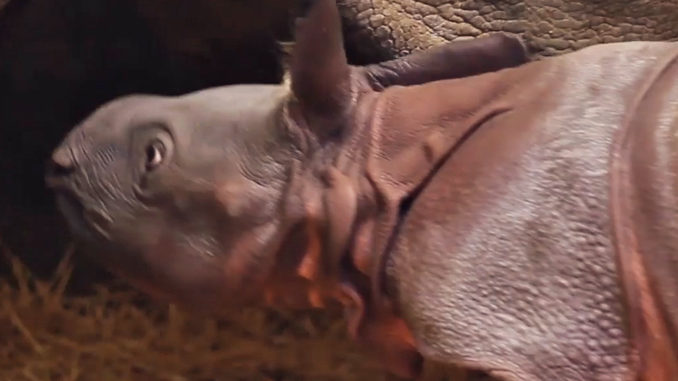
A greater one-horned rhinoceros calf is its first newborn animal of 2018 at the Toronto Zoo.
The Toronto Zoo says Ashakiran, a 13-year-old female greater one-horned rhino, gave birth to a male calf on Thursday, January 4, 2018, at 11:04 a.m., making the male calf the first birth of 2018 for the zoo.
This is the fifth birth of a greater one-horned rhino in the Toronto Zoo’s history and the second calf for Ashakiran (Asha) and father Vishnu.
Asha gave birth to male Nandu on February 17, 2016.
Toronto Zoo Great One-Horned Rhino Calf Nursing
We are excited to announce that Ashakiran, a 13-year-old female greater one-horned rhino, gave birth to a male calf on Thursday, January 4, 2018, at 11:04 am. This is the first birth of 2018 for the Zoo.? ?
A greater one-horned rhino’s gestation lasts 425 – 496 days (approximately 16 months). Ashakiran, affectionately known to her keepers as “Asha”, was moved from public viewing into a maternity area mid-December where video cameras were set in place for Wildlife Care staff to monitor her closely. While the calf appears healthy and feeding well, the first thirty days will be critical for both mom and calf. This is the second calf for Asha and father Vishnu. Asha gave birth to male Nandu on February 17, 2016. This is the fifth birth of a greater one-horned rhino in the Zoo’s history.
This recent birth is very important for greater one-horned rhino conservation, also known as the Indian rhino, as the species is currently listed as Vulnerable on the International Union for Conservation of Nature (IUCN) Red List of Threatened Species and there are only approximately 3,500 left in the wild. The Toronto Zoo is part of the Greater One-Horned Rhino Species Survival Plan (SSP), which aims to establish and maintain healthy, genetically diverse populations, and overall conservation efforts to save this incredible species. The Zoo supports rhinoceros conservation efforts in the wild through keeper driven events and the Toronto Zoo Endangered Species Reserve Fund.
Watch below to see him nursing from mom, Asha. ? Please note: Toronto Zoo Wildlife Care staff will continue to closely monitor Asha and her calf in the maternity area, which is not visible to the public at this time. #RhinoDiaries #savingspecies
Posted by The Toronto Zoo on Friday, January 5, 2018
